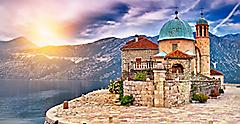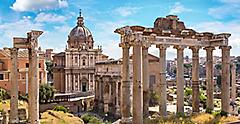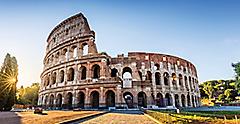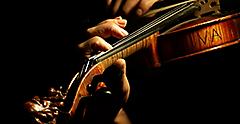
Inside The Italian Opera World
While some elements of opera have percolated through pop culture around the world, there's nothing that compares to experiencing it in person. Opera represents some of the most dramatic, and therefore most relatable, elements of being human. Stories of happiness, sadness, lust, grief, pride, tragedy, and luck are told through songs that can evoke emotion even in those who don't know the words. Captivated by the composer, you're pulled along on their journey. As the orchestra plays louder, your heart beats faster, every emotion at the mercy of the opera. This, along with the drama of intricate costumes and stage settings, sweeps the audience into the story.
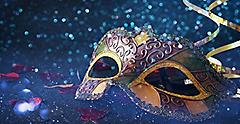
Even without the fanfare and elaborate scenery, opera can be a moving experience. Travel writer Jill Schildhouse took an Italy cruise that did not have opera listed on the itinerary. While the ship was anchored off the coast of Sorrento, she and the other guests were told to make their way to the pool deck for a special concert. It was nighttime, and a chilly breeze blew over the water. She grabbed a blanket and took a seat. To her surprise, an opera singer, a tenor, and an accompanying pianist performed under the stars.
She says, "I didn't understand any of the words, but it didn't matter. The opera singer sang with such emotion, such expression, that you could instantly tell if it was a love song, a song of mourning, or a song of celebration. During 'Funiculì, Funiculà,' we all clapped along. It was a beautiful experience and one I still think about a full decade later." The beauty of opera can affect you in ways you may not even imagine.
Italian Opera And Its Influence On The World
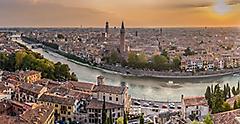
Opera originated in Italy, with Ottavio Rinuccini and Jacopo Peri's "Dafne" (1598) being the first known opera performed in Florence at the end of the 16th century. The opera that's still played today, by the same duo, is "Euridice" (1600), the tragic love story of Orpheus who attempts to bring his deceased wife back to life through music. This is one of the most famous Italian operas. Most of Italy's early operas were retold classical Roman and Greek myths and legends.
These initial Italian operas were beloved by Italian aristocratic society but rarely reached Italy's common folk. When the first true opera house, Teatro di San Cassiano, opened in 1637 in Venice, opera became more accessible to the public. Wealthy merchants and their families sat among the crowds, as did anyone else who could afford it. Operas incorporated themes into their stories that were relatable to Italy's lower classes, rather than solely the elite. Opera composer Claudio Monteverdi used this art form to depict historical events in "L'incoronazione di Poppea," which was widely popular when it was released in 1643. Monteverdi's "L'Orfeo" (1607) is still one of the most beloved and performed operas to date, containing some of the world's most famous Italian opera songs.
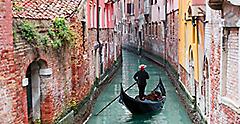
Opera companies toured Italy and ventured further afield throughout Europe. The lead singer of the opera, the prima donna or primo uomo, often became famous for their grand offstage personalities, heavily influencing the Italian music culture around celebrities. The most talented opera singers out-earned many other artists of their time, often including the composer. Wealthy sponsors from outside of Italy would frequently hire opera performers for their own productions, expanding opera's influences and creating a multicultural form of live performance.
By the end of the 18th century, Italian opera was a major influence on the music being produced around Europe. Some opera academies argued that the opera was changing too quickly and needed to return to its origins. This gave rise to multiple categories of opera that ranged from classic (opera seria) to experimental (opera buffa).
Opera as an art form had piqued the interest of German-speaking composers like Wolfgang Amadeus Mozart, who collaborated with Italian librettist Lorenzo da Ponte to create "The Marriage of Figaro" (1786), one of the most widely performed operas of all time. Operas around this time introduced populist themes that catered to the common person. This opened opera to people who might've thought it to be too pretentious to experience before — although each full opera still took an immense number of resources and hired talent to produce. Italian composer Niccolò Piccini blurred the lines between classic and experimental opera, like in his "The Accomplished Maid" (1760). Giachino Rossini picked up the baton from Piccini and crafted "The Barber of Seville" (1816), which was widely loved from its onset and managed to be both moving and funny.
From the 1830s to the turn of the 20th century, the separation between opera categories gave way to mixed opera styles. Composers like Giuseppe Verdi, who became one of the most famous Italian opera composers of his time, used opera to push political themes and experiment with new artistic ideas. For this, he was frequently censored. Richard Wagner developed operas far outside the norms at the time and revolutionized the way opera would be performed in the future. He took inspiration for his "Parsifal" (1882) from a trip to Ravello, Italy. Giacomo Puccini focused on the power of the human voice to convey the struggle of poverty, like in "La Bohème" (1893).
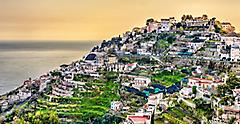
Where To Experience The Opera In Italy
In visiting Italy for vacation, you may notice that no two operas are quite alike, and like all art, choosing a favorite tends to be a matter of personal preference. Some end in tragedy, others have you leaving the theater with a spring in your step. The emotion each opera touches on can change from song to song and even from person to person. But, if you're looking for a place to start, some operas are more popular than others.
A handful of the most influential Italian operas are "L'Orfeo" (1607) by Monteverdi, "The Marriage of Figaro" (1786) by Mozart, "The Barber of Seville" (1816) by Rossini, "Norma" by Bellini (1831), "La Traviata" (1853) by Verdi and "La Bohème" (1893) by Puccini. Most opera houses offer a libretto, the written work of the opera, and subtitles to help patrons follow along with each tale.
If you want to experience Italian music culture in its most authentic form, these are the best places to witness the beauty of the opera on your Italian vacation.
Teatro Alla Scala, Milan
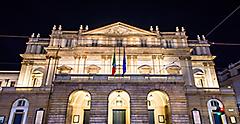
Built in 1778, Teatro alla Scala (commonly called "La Scala") is one of the most famous opera houses in Italy, if not the world. While attending an opera here is bound to be an unforgettable experience, it's worth visiting even if you don't have your finest attire on and a ticket in hand.
The venue hosts onsite museum paintings, costumes, and memorabilia that offer an inside perspective of the work that goes on while curtains are closed. Take a guided tour of the theater, which includes not only a walk through the grand hall of the theater but also a look inside the workshops where the costumes and stage settings are crafted. The orchestra, chorus, and ballet at Teatro alla Scala are famed for being some of the most talented performers in the world, so attending an opera here is bound to be memorable. This is also one of the most family-friendly opera houses in Italy with family-specific seating areas and operas written for children taking place regularly.
Teatro Di San Carlo, Naples
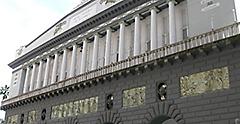
Teatro di San Carlo is the oldest working opera house in Europe, originally built in 1737. It was rebuilt after a fire burned the original theater down in 1817. The theater once hosted Rossini as its resident composer, and the stage saw some of Verdi's most iconic opera debuts.
The grand golden hall with royal red decor and elaborate frescoes is a symbol of the opulence the opera is famous for. Come daytime to peek into the royal box and learn about how each show is made. Once the sun goes down, this theater welcomes opera productions from all around the world that are bound to delight in a space that has been offering evocative experiences for nearly three centuries.
Teatro La Fenice, Venice
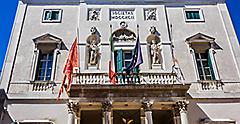
Fenice means phoenix in Italian, and there are few theaters in the world so aptly named. It opened its doors in 1792 and has risen from the ashes of two fires throughout its history. And, it only came into existence to replace the San Benedetto Theater that had burned down prior to its existence. Theater fires were common before electricity was invented, as theater halls could only be lit by oil lamps and candles. With thousands of attendees and performers shuffling around in the dark, it was a recipe for disaster.
Like the stories in opera, the construction of the theater was rife with scandal and drama, often attracting critique from the public. Take a stroll through the theater and admire its intricate frescoes, ornate chandeliers, and architectural elegance. Experiencing an opera in Venice, where the art form first became available to the public, is one that is quintessential to Italian music culture.
Arena Di Verona
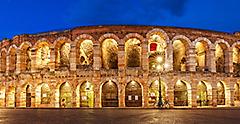
The Arena di Verona takes opera back to its origins in Roman mythology. This Roman amphitheater is thought to have been built in 30 A.D. and once hosted 30,000 spectators (today it seats 15,000). During the Renaissance, it became a popular place to perform operas, largely thanks to its grand seating capacity and clear open-air acoustics. Today, it welcomes opera audiences at its regular shows and opera festivals.
No matter if you wear your finest attire and enjoy a night of opera in one of Italy's finest theaters or stumble upon a musician practicing for their audition out on the streets, you'll feel the infectious energy of Italy's rich music and art culture. Sit back, relax and let the opera carry you away to a new world.
Get Royal Deals, Sign Up Today

Getting There
Explore Our Most Affordable Itineraries
Take in an opera show as you visit Italy for a cruise vacation.



